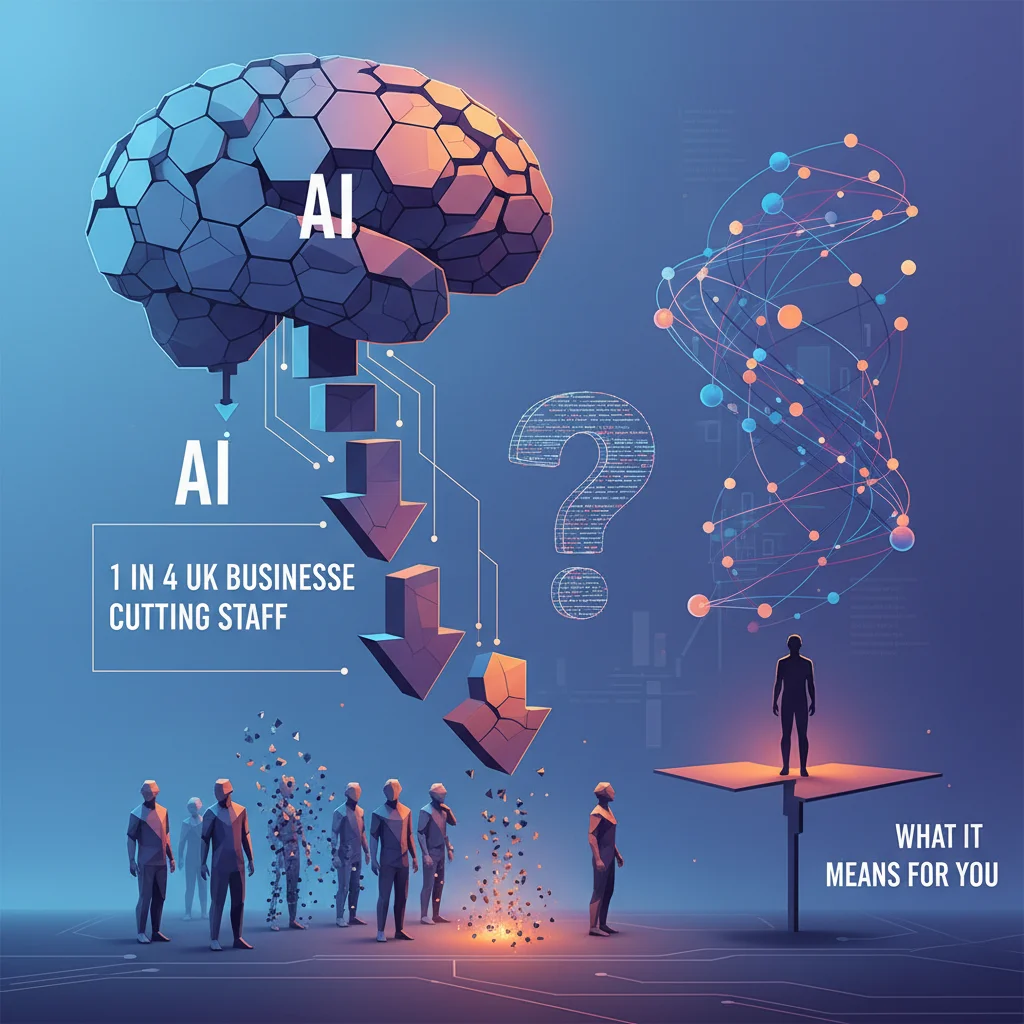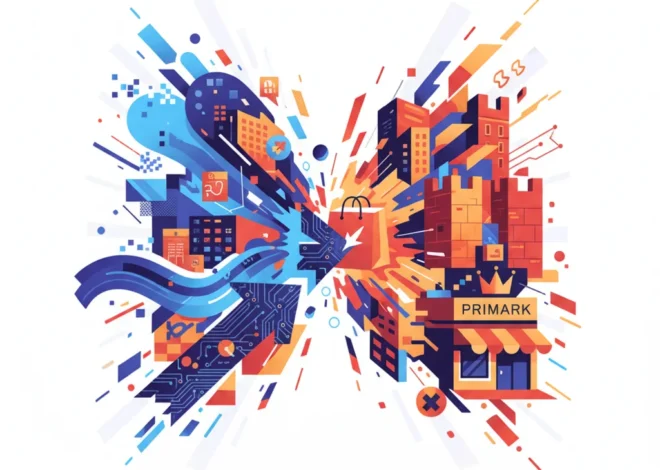
AI’s Tipping Point: Why 1 in 4 UK Businesses Are Cutting Staff (And What It Means for You)
It’s a conversation happening in boardrooms, on developer forums, and around dinner tables everywhere: Is artificial intelligence coming for our jobs? For years, it felt like a distant, sci-fi concept. But the last couple of years have slammed the accelerator. Now, it’s not a question of ‘if,’ but ‘when’ and ‘how.’ A recent, sobering piece of research from the UK has just given us the clearest answer yet.
According to a survey of major British employers, the ‘when’ is now. The research reveals a startling statistic: one in four large UK businesses expect to reduce their staffing levels in the next year specifically because of the implementation of AI. This isn’t a vague, five-year forecast. This is a strategic shift happening on a 12-month timeline.
For tech professionals, developers, entrepreneurs, and anyone building a career in the modern economy, this isn’t just a headline—it’s a fundamental signal of a workforce in transformation. Let’s break down what this data really means, who is most affected, and how you can navigate this new landscape not just to survive, but to thrive.
The Data Unpacked: A Tsunami of Change for Entry-Level Roles
The core finding of the survey is both simple and profound. As companies increasingly integrate AI-powered software and automation into their workflows, they are identifying significant efficiencies. The result? A planned reduction in human headcount for tasks that can now be handled by sophisticated algorithms and machine learning models.
But the devil, as always, is in the details. The research specifies that junior and entry-level roles are the most likely to be on the chopping block. Why? Because these positions often involve tasks that are structured, repetitive, and data-centric—the perfect sweet spot for today’s AI capabilities. Think about roles centered around:
- Data entry and processing
- Basic customer service inquiries
- Report generation and summarization
- Scheduling and administrative support
- Content moderation and tagging
These are the foundational tasks that have long been the training ground for new entrants into the workforce. The survey suggests that this traditional career ladder may be losing its first few rungs. For businesses, the logic is compelling: a single AI-driven SaaS platform, running on the cloud, can perform the work of several employees faster, more accurately, and 24/7. This isn’t just about cutting costs; it’s about re-engineering the very concept of productivity.
To visualize this shift, consider the types of tasks AI excels at versus those that still demand a human touch.
| Highly Automatable Tasks (At Risk) | Human-Centric Tasks (In Demand) |
|---|---|
| Processing invoices and categorizing expenses | Strategic planning and long-term vision |
| Answering frequently asked customer questions via chatbot | Handling complex, empathetic customer negotiations |
| Writing simple, formulaic code snippets | Designing novel software architecture and complex systems |
| Summarizing long documents into bullet points | Creative problem-solving and brainstorming for innovation |
| Monitoring network traffic for known security threats | Developing sophisticated cybersecurity defense strategies |
This table illustrates the core of the transformation. AI is taking over the ‘what’ and the ‘how’ of routine work, pushing human value up the chain to the ‘why’ and the ‘what if’.
The Million-Dollar AI Job You’ve Never Heard Of: Rise of the Forward-Deployed Engineer
The same will be true for AI. The key takeaway from this UK survey isn’t just “jobs are being cut.” It’s that “the *nature* of work is changing, and the skills required are evolving at an unprecedented speed.” The pressure is now immense, not just on individuals to learn, but on companies and governments to facilitate mass-scale upskilling. The real crisis won’t be a lack of jobs, but a catastrophic skills mismatch if we fail to adapt.
Beyond Job Cuts: AI as a Catalyst for New Opportunities
While the immediate focus is on job reduction, it’s crucial to look at the other side of the equation. The same technological wave that displaces certain roles is simultaneously creating entirely new ones. The burgeoning AI economy requires a new class of professionals:
- AI/ML Engineers: The architects building the systems. Demand for skilled developers with experience in programming languages like Python and frameworks like TensorFlow is skyrocketing.
- Prompt Engineers: A new discipline focused on crafting the perfect instructions to elicit the best results from generative AI models.
- AI Ethics and Governance Specialists: As AI becomes more powerful, professionals who can navigate the complex ethical, legal, and social implications are becoming indispensable.
- AI System Integrators: Experts who can seamlessly integrate various AI tools and platforms into a company’s existing tech stack.
- Cybersecurity Experts: With AI creating new attack vectors, the need for cybersecurity professionals who understand how to defend AI systems (and use AI to defend against attacks) has never been greater.
Moreover, AI is not just a job replacer; it’s a powerful augmentation tool. For a software developer, an AI coding assistant like GitHub Copilot can handle boilerplate code, allowing the developer to focus on complex logic and architecture. For a marketer, AI tools can analyze vast datasets to identify trends, freeing up time for creative campaign strategy. This “centaur” model—human intelligence paired with AI efficiency—is where many believe the future of professional work lies.
The rise of AI is also a massive opportunity for startups. Entrepreneurs who can identify a tedious, inefficient workflow and build a slick, AI-powered SaaS solution are poised for immense success. The entire landscape of business software is being rebuilt from the ground up with AI at its core, creating a gold rush for agile and innovative new companies.
The AI Takeover: What a Secret Academic Leaderboard Reveals About Our Future
How to Future-Proof Your Career in the AI Era
The message from this research is clear: complacency is not an option. Whether you’re a student, a junior employee, or a seasoned professional, proactive adaptation is essential. Here’s a strategic approach to not just protect your career, but accelerate it.
1. Cultivate Your “Irreplaceable” Human Skills
Focus on abilities that AI struggles to replicate. These are often called “soft skills,” but in the AI age, they are the new hard skills:
- Critical Thinking & Complex Problem-Solving: The ability to analyze a novel, multifaceted problem and devise a creative solution.
- Emotional Intelligence & Communication: Building relationships, negotiating, leading teams, and understanding nuanced human context.
- Creativity & Innovation: Thinking outside the box and generating truly original ideas. AI can remix and iterate, but true originality remains a human domain.
2. Become an AI-Powered Professional
Instead of viewing AI as a competitor, see it as a collaborator. Master the tools relevant to your field. If you’re a programmer, learn to use AI code assistants. If you’re a designer, experiment with generative image models. Become the person in your organization who understands how to leverage AI to achieve a 10x improvement in productivity. This skill alone will make you invaluable.
3. Embrace Continuous Learning (Lifelong Upskilling)
The days of learning a skill and coasting for 20 years are over. The pace of technological change demands a commitment to continuous education. Follow industry trends, take online courses in machine learning or data science, and understand the fundamentals of how AI technology works. For developers, this means staying on the cutting edge of AI-related programming and infrastructure.
The report that one in four large companies are poised to act is a wake-up call. It signals the end of the beginning for the AI revolution. The experimental phase is over, and we are now entering the age of implementation.
The AI Revolution in the Call Center: Annihilation or Evolution?
Conclusion: The Choice Ahead
The data is not an indictment of human workers but a testament to the power of technological innovation. The workforce is being reshaped by the powerful forces of automation and artificial intelligence, and the roles most vulnerable are those that are most routine. While this presents a significant challenge, especially for those in junior positions, it also heralds an era of unprecedented opportunity.
The future belongs to those who can work alongside intelligent systems, who can bring uniquely human skills to the table, and who embrace change as a constant. The question is no longer whether AI will change your job. The question is how you will change to meet the future of work.

